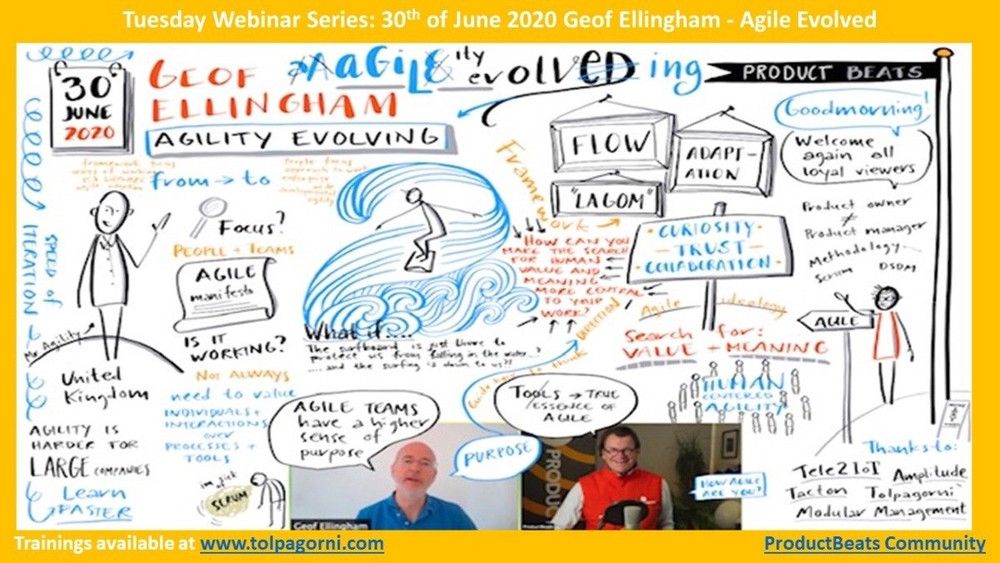Episode 15: Agile Evolved w/Geof Ellingham
30 June, 2020 / Host: Magnus Billgren
Agile Evolved: From Framework Focus to People Focus
Agile has been around for over two decades now, and it has been adopted by a vast number of companies worldwide. However, despite its widespread implementation, Agile has yet to fully realize its potential in terms of enabling organizations to become more adaptable and productive. In this article, we will explore the evolution of Agile from a framework focus to a people focus, and how this shift can help organizations overcome the challenges of becoming truly Agile.
Focus and the Agile Manifesto
The Agile Manifesto, created in 2001, outlined a set of values and principles for software development that prioritized people over processes and tools. These values include:
- Individuals and interactions over processes and tools
- Working software over comprehensive documentation
- Customer collaboration over contract negotiation
- Responding to change over following a plan
Agility Today in Numbers
Agile has become the norm in the software development world, with 95% of work in "Agile" companies. However, only 5% of these companies say that Agile is enabling greater adaptability. This is in part due to the fact that productivity gains from Agile are less than 10%, and less than 5% in large companies.
Scaling Agile is particularly challenging for large companies, with 48% of companies citing general organizational resistance to change as a primary challenge. Other challenges include not enough leadership participation (46%) and organizational culture at odds with Agile values (44%). According to research, only 21% of organizations can be considered "mature" in business agility, with an average maturity rating of 5.4 for companies with less than 50 employees and 3.7 for companies with more than 10,000 employees.
A Metaphor for Business Agility
A tanker ship is not an appropriate metaphor for business agility. Instead, a surfer is a more fitting analogy. The waves represent complexity, uncertainty, and change, while the surfer needs to be resilient, adaptive, and creative to navigate them. Business agility is about evolving values, behaviors, and capabilities to become more resilient, adaptive, and creative in the face of complexity, uncertainty, and change, leading to better business outcomes and wellbeing.
Lessons from Research
Research on meaning at work has shown that finding meaning at work is a key driver of employee engagement and effectiveness. To find work meaningful, people need authenticity, self-efficacy, self-esteem, purpose, belongingness, transcendence, cultural and interpersonal sensemaking.
Ideology
The Agile community has been focused on frameworks and methodologies such as Scrum, but it is essential to go beyond these tools to create a truly Agile organization. As Geof Ellingham, Director of the Agile Business Consortium, stated, "I am so fucking sick of talking about Scrum. [laughter] I don't give a shit about Scrum, I don't give a shit. It almost makes me feel a little bit dirty, it almost makes feel like I'm pimping something."
Human-Centric Agility
To create a more human-centric Agile organization, it is essential to focus on the search for value and meaning in work through deliberate practice in curiosity, trust, collaboration, flow, adaptation, and lagom. Agile ideology is about curiosity, trust, collaboration, while frameworks focus on flow, adaptation, and lagom.
Agile in Wonderland Developmental Stage Coaching Model
The Agile in Wonderland Developmental Stage Coaching Model is a useful tool for organizations looking to create a more human-centric Agile organization. The model breaks down the developmental stages of Agile into four categories: machine, family, living system, and Wonderland team. Each stage has specific skills, performance development, and transformation
Takeaways
- Agile methodology is not a one-size-fits-all solution: Agile is a flexible methodology that can be adapted to suit different types of projects and organizations. It's essential to understand the principles and values of Agile and tailor the methodology to your team's specific needs and goals.
- Agile is not just for software development: While Agile was initially developed for software development, its principles and values can be applied to any project, regardless of the industry. In fact, Agile has been used successfully in marketing, HR, and even government agencies.
- Continuous improvement is at the heart of Agile: One of the fundamental principles of Agile is continuous improvement. Teams should continually evaluate their processes and identify areas for improvement. By embracing change and adapting to new circumstances, Agile teams can deliver better outcomes and provide more value to their customers.
Geof Ellingham's insights on agile methodologies and their evolution in the industry shed light on the importance of continuous learning and improvement for product managers. If you're interested in deepening your understanding of product management and acquiring new skills to stay competitive in today's market, you may want to consider enrolling in a professional certification program. The Productbeats Product Management Certification Program offers comprehensive training and certification for aspiring and experienced product managers alike. With a focus on practical skills and real-world scenarios, this program can help you take your career to the next level.
You might also enjoy watching...
Copyright © 2026 ProductBeats AB

Get The Program Brochure
Submit the form below to have The Program Brochure delivered to your inbox
The title of the notification
The descriptive text of the notification


